These are some of the things I observed in the last decade, written in no specific order. Some of these can spawn ideas, or just create discussion. Feel free to reach out to chat.
- Interest rates dropped to incredible lows relative to US history, spawning a bull market that has been one of the longest in recent decades.
- Software ate the world.
- Inflation is here, just not evenly distributed.
- More time than ever before in the history of humanity was spent playing video games during this decade.
- Colleges are more expensive than ever before.
- Passive investing went mainstream. The world is OK buying a LOT of companies at average prices.
- The world was largely peaceful, barring the absence of any major wars, with the US winding down it’s existing wars.
- The new model of content consumption is less about renting a specific title or song, it is about renting the option to watch a group of titles.
- The biggest content company in the world went Direct to Consumer, disintermediating the distributors and getting access to consumer data directly.
- Netflix proved to the world that it is able to generate somewhat watchable content powered by data (and debt).
- It’s easier than ever to make music, video or any form of content. Harder than ever to find a paying audience, despite better distribution.
- VR failed to deliver on it’s promise. AR shows promising potential.
- Bitcoin goes mainstream. Positively correlated with negative developments in world politics (wars, inflation). Digital Gold thesis holds.
- Venture Capital goes from a specialized asset class to a mainstream asset class that (1) deploys a lot of capital (2) hires a lot of people to help deploy the capital. As a corollary to (1) and (2), it hence follows that VC returns are going to stagnate over the next decade.
- The risk of starting a technology company is at an all time low. For founders, distribution is still king.
- Brokerages adopt zero fee across the board. Money is now made from order flow, and less from commissions.
- A lot of technology companies were started and sold.
- The rise of the Chief Growth Officer, and the decline of the traditional CMO. Metrics and Impact drive marketing outcomes.
- Amazon goes beyond an everything store to become an everything company.
- The decade of the cloud, as companies flock to rent rather than build their own servers.
- The Internet is now where groups of people gather, interact and socialize. There is a premium on face to face/offline interaction.
- Online Dating/Matchmaking is no longer culturally taboo.
- Data everywhere, and an abundance of it. More tools to collect, ingest and warehouse data and not as many tools to make sense of it.
- The rise of the data scientist as a full time profession.
- AI starts achieving breakthrough precision in certain narrow domain fields.
- The Privatization of the Space Industry has started in full flow.
- The US-China relationship that powered the last 15 years of economic growth is now under strain as affluent China contends with it’s own agenda in the world. I suspect India will be next.
- A lot of talk, but very little progress on Climate Change and reducing our carbon footprint.
- Algorithms began to permeate culture, beyond newsfeeds, into what goes into your music playlists and what gets watched on video platforms.
- Big Content Franchises – Star Wars, Marvel continue to dominate popular culture. The presence of a quality long tail has only reinforced the power of iconic brands, rather than weaken them.
- Silicon Valley’s influence over the world spiked in the early decade, then diminished. Trust in the valley to self-regulate is currently low.
- Antitrust Government locked it’s targets onto Big Tech for the first time.
- Apple continues to sell a ridiculous amount of iPhones.
- SaaS companies are being slowly better understood by the marketplace. Valuations are still expecting the world of them going into the next decade.
I looked at the data YCombinator published recently and ran a quick analysis on it. I scraped it and parsed the data into a CSV, along with some of YC’s historical data. Link: http://www.ycombinator.com/topcompanies/
- I assumed “Rank” in this case implied valuation. I developed a “Vintage Rank” heuristic to determine the best vintages in terms of return on investment.
- To look at YC’s overall investments and hit rates, I fetched the data from their past investments that actually launched to the public. YC says there are over 1900 companies in their portfolio, but I could only get ~1600 from their public database so about 15% of them did not launch publicly.
- Hit rate: % of total companies invested (public) that went on to make the top 100 list.
- When I say best or worst vintage, note that these are still referencing some incredible companies. I am merely comparing the vintages within each other on ROI.
- Of YC’s winners, it seems that the 2005, 2007 and 2009 were some of YC’s best. 2017 has high potential to become another great vintage.
- Vintage with the most number of companies in top 100: 2011, with a whopping 14% of investments making it.
Charts (more below, after analysis):
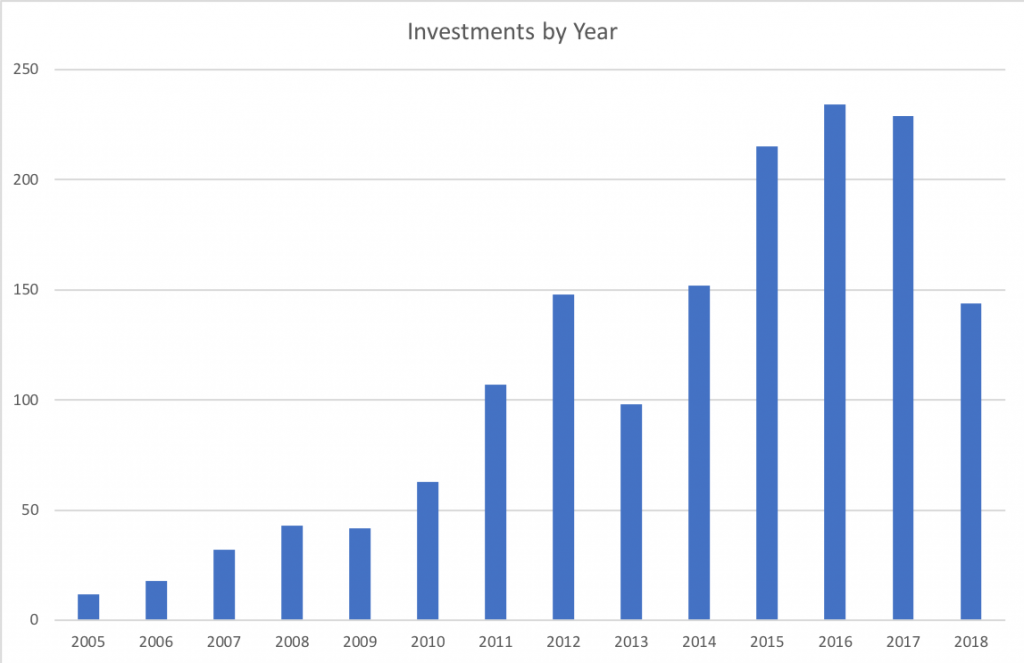
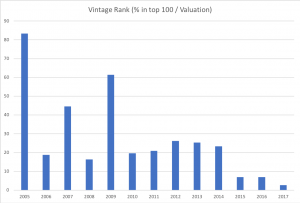

Key insights:
- 2005: Early days of the fund. Big win with Reddit that likely set the stage for future years of YC. Per the Vintage Rank chart above, this was the best vintage ever. Begs the question, if this had not happened, would YC still be around?
- 2006: 2006 has had the best hit rate of all the years in the early days of the fund. But these did not end up at the same Unicorn valuations as Reddit. High hit rate, lower valuations. Companies: OMGPop, Scribd.
- 2007: High valuations, high hit rate. Very very good vintage, another good one in the early days of the fund. Companies: Dropbox, Twitch, Weebly.
- 2008: One of the weakest vintages inspite of one great investment – Machine Zone. Lowish hit rate, Average valuations. Machine Zone still carrying this vintage with a $6B valuation.
- 2009: Incredible vintage. Probably YC’s best, with one caveat: They have had more time than other vintages to develop their value. But if you assume inverse-power-law dynamics of technology markets, you can safely assume that this will remain that way. Companies include: AirBNB, Stripe, MixPanel. They have created a large number of jobs, even when controlled for the lifespan of the company.
- 2010: One of their weakest vintages in terms of jobs created, especially if you assume the amount of time they’ve been in market for. However, in terms of relative valuation (rank) they are somewhere along the median rank. Low hit rate, lowish valuation.
- 2011, 2012 and 2013: Whopper years in terms of the number of companies in the top 100, but very low relative valuations. Very interesting vintages. 2012 in particular has 18 companies in the top 100. In terms of jobs created, they are somewhere along the average. Caveat: They have had less time to evolve their businesses and have not yet hit the 10 year mark.
- 2014: In terms of Jobs created, 2014 is actually a really strong year (only second to 2016), even when controlled for the amount of time they’ve had to create those jobs. Reason is because this includes Cruise, and Flexport – two operationally intensive businesses that needed lots of humans. They have also had some of the best valuations between the 2012-2017 range (see Average Rank chart)
- 2016: 2016’s jobs created number is extremely high due to Rappi, another operationally intensive business*. Still too early to call the success of this cohort.
- 2017: Very interesting in terms of rank and valuation. They have one big ranker – Brex. And Faire, which ranks at around 51. Probably on track to become one of YC’s biggest vintages ever, maybe even beating 2009.
* I am not sure if YC is including jobs created by the company prior to the investment being made, this might inflate the number.
Interesting questions to ask:
- Clearly, 2005 was a great year and YC’s success with Reddit set the model. If that had not happened, would YC have gone on to enjoy the same success over many years? i.e did Reddit and the early years carry the rest of the fund?
- Has YC gotten better at predicting big wins? It is hard to say from aggregate data, since we’d have to run a cohort analysis. But the vintages 2011-2014 were really good in terms of predicting hits, a marked improvement over their initial days of starting the fund.
- Do jobs created in year 1,2,3 after investment serve as a good proxy for valuation? YC should be able to get pretty good at predicting which of their investment will generate serious returns.
More charts:
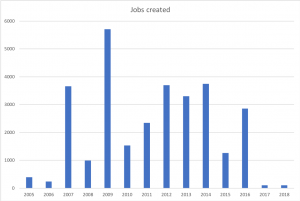
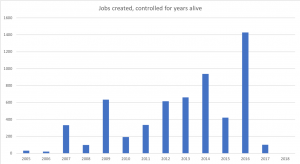
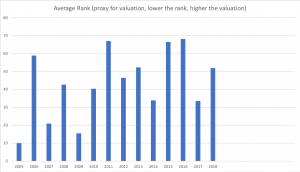

Successful companies are creators of value. It occurred to me that some of the best entrepreneurs effectively solve a problem by connecting multiple systems and streams of value.
- In the case of Uber, there was a complex co-ordination issue that involved connecting riders and drivers but also balancing the economics of the transaction.
- SpaceX connected hundreds of moving parts in the rocketry business – from radios (they built their own), telemetry, navigation, reusability, engines – using a combination of vertical integration and clever design and manufacturing, creating enormous value.
- SONOS was able to connect value streams from audio hardware to playback software, to music quality, to listening convenience for the consumer. Wherein music playback software was quickly being dominated by Spotify, they intelligently partnered with Spotify to allow for seamless casting.
etc.
My point here is that aside from the usual barriers to entry, it is harder – but is typically amplifying in value when you connect multiple systems, and streams of value.
In solving a problem, I ask myself – are there multiple systems or streams of value to be connected together, in a way that the sum of the parts is atleast 100-200x more valuable than any singular part?
Conversely, it seems it would be hard to build long-term value by leveraging a single stream of value.
Music is one of the most important products in the world. Or as Steven Wilson would say, one of the wonders of the world.
When I got on a plane to Berlin, Germany in Dec 2011, little did I know what a wild adventure it would be for the next 6 years. I am proud of the work we did at SoundCloud, and growing the product from a small but passionate creator community to the top 20 consumer apps in the world, reaching 175m+ users monthly. This is one of those memorable outcomes that will stay with me for a long time.

That said, the business of music is tricky. Entrenched business models, miniscule unit economics, complemented with competition from monopolistic tech giants – makes it a pretty improbable place to thrive. The early team at SoundCloud, starting from Alex and Eric had a refreshing, idealistic perspective on what could be the ‘music industry’, and this vision has always played a part to what’s kept me at SoundCloud.
I’ve been thinking about what’s next for a while now, but never jumped into something headlong as I didn’t quite see the right opportunity. Personally, I’ve always been fascinated by the arbitrage opportunities available in
– Healthcare
– Insurance
– Legacy Finance
After dozens of conversations with companies across the spectrum, I found the perfect fit. I just accepted a role at Zocdoc, leading their Mobile Product and Growth teams.
I’m very excited to join a group of incredibly smart, talented people – some of whom have done it before, but most importantly are hungry to push forward and change the way the healthcare system works for millions of people. Whether it’s about trimming the fat in the industry, reducing inefficiencies, or just creating better models of business – there’s plenty of opportunity, and Zocdoc is best positioned in the space to attack those problems at scale.
There’s never been a better (or more important) time to be working on healthcare, especially in America. Let’s do this.
My first introduction to Joi Ito’s work came via his investment in our online gaming company, GameVentures in Singapore a few years ago. Since then, I’ve followed his work closely as he’s just generally awesome. Loved this particular blurb from a recent interview.
Ito: Making maps is a long and very expensive process, and the idea of compasses over maps is that one should have a goal, vision, or long-term, detailed plan, especially as the world is complex and always changing.
Somebody once told me a story about a film director who said that the difference between a great and a not-great film is that you have an image of what the movie is in your head. When everyone reads a script, everyone can imagine a completely different movie.
A great director’s job is making sure that everyone on set is making the same movie in their heads, whether it’s a craft services person, a driver, or the director of photography. That’s the idea of the compass. It’s that we know where we’re all trying to go.
You can also look at Wikipedia, an organization with neutrality as a stated goal. The community believes and buys into the organization’s whole ideology, but it also allows individuals to all do different things while those values hold the entire project together.
A lot of organizations and traditional, industrial-age institutions have been about plans, structures, and preparation, but we’re all aware that agility, speed, and the ability to pull from a network is much more important in order to all make the same movie.
Full interview with Joi here.

Extreme Ownership: How U.S. Navy SEALs Lead and Win
I’m usually not the biggest fans of military leadership books, primarily due to the excessive jingoism found in contemporary titles. However, I remember reading about this book somewhere and decided to dig in as I’ve always been fascinated by the Navy SEAL units of the special operations unit since I was a child, their rigorous training and discipline included.
While I didn’t find the business stories/anecdotes particularly interesting, I had fun reading through some of the mission reports of the SEALs and their measured, tactical approach to getting a mission done. The book is organized into chapters that teach a specific lesson, and I’m going to organize my notes in the same way.
Winning the War Within
– Extreme ownership: Leaders should be accountable far beyond their initial remits. If something outside of your chain of command is broken, it is still on you as the leader to own/fix it.
– No Bad Teams, Only Bad Leaders: Example from BUD/S training’s extremely stressful rowing exercise where swapping out a winning team’s leader with a losing team’s leader led to the losing team winning. Author claims that the buck has to stop with the leader.
– Believe: Important to believe in the mission from above and be fully invested in it. If you are not invested, you will never convey a convincing message down the ranks. If you are unclear about mission parameters, it is important to question up the chain of command until you fully understand and are 100% invested in the mission.
– Check the Ego: Teams above individuals. Mission above everything else (yes, including people).
Laws of Combat
– Cover and Move: Implies teamwork. Most fundamental tactic, perhaps the only tactic. All elements within the greater team are important to the mission and must work together to accomplish goals. Often when smaller teams get so focussed on what they are doing, they forget about others or how they depend on other teams. They may start to compete, and when there are obstacles, blame and animosity develops. Leaders to continually keep perspective on the strategic mission and remind the team that they are part of the greater team and the mission is paramount.
– Simple: Keep things as simple as possible. Complex commands/instructions get further complicated once you deploy into the battlefield. Simple does not mean easy, and in fact the opposite. But it empowers decentralized decision making which is important. Also important that the frontline troops have the opportunity to ask questions about what’s important, in order to demystify the simplicity.
– Prioritize and Execute: In extremely complex situations, SEALs have a saying – “Relax, look around, make a call”. With a bias towards action, making a call is far more important than staying still and can often mean life or death. Prioritize the highest priority task and execute, when overwhelmed. Steps include:
* Evaluate the highest priority problem.
* Lay out in simple, clear terms the highest priority effort for your team.
* Develop and determine a solution, seek input from key leaders and from the team whenever possible.
* Direct the execution of the solution, focussing resources on it.
* Move to the next highest priority problem. Repeat.
* When priorities change, pass information up and down the chain.
* Don’t let one priority cause fixation. Maintain the ability to see other problems developing and rapidly shift as needed.
– Decentralized command: Humans not typically able to manage more than 6-10 people. Imperative that frontline leaders can execute with confidence.
Sustaining Victory
– Plan: A bad plan is better than no plan if all the other factors highlighted above are in place. But, to plan well –
* Analyze the mission
* Identify personnel, resources, assets and time available
* Decentralize planning
* Empower key leaders within team to analyze possible courses of action
* Determine specific course of action
* Lean on simplest path, focus efforts on the best course
* Empower key leaders to develop plan for specific chosen course of action
* Plan for likely contingencies through each phase
* Mitigate risks that can be controlled as much as possible
* Delegate portions of the plan and brief to key junior leaders
* Stand back and be the tactical genius
* Continually check and question the plan against emerging information to ensure it still fits the situation.
* Brief the plan to all participants and supporting assets.
* Emphasize commander’s intent.
* Ask questions and engage in discussion and interaction with the team to make sure they fully understand.
* Conduct post-op debrief after execution.
* Analyze lessons learned and implement them in further planning.
– Leading up and down the chain of command:
Leading up as important as leading down. Takes more skill and influence to lead up. If your leader is not supporting you, you take responsibility to communicate better and make sure they have the information they need.
– Decisiveness amidst Uncertainty:
In the case of overwhelming situations, leaders cannot be paralyzed by fear. Important to make a decision and move forward, using the best and immediate information they have available. Trying to find the 100% right solution leads to delay, and decay.
– Discipline equals Freedom: One of the most important yet difficult aspects of leadership is to balance multiple lines. Leader has to be confident but not cocky, competitive but a gracious loser, attentive to details but not obsessed by them, strong but have endurance, a leader and a follower, aggressive not overbearing, quiet not silent, calm but not robotic, execute extreme ownership with decentralized command.

A Guide to the Good Life: The Ancient Art of Stoic Joy on Amazon.
on Amazon.
Stoicism came in two flavors = Greek, and Roman.
The Greek Stoics believed in the pursuit of virtue, in becoming an excellent human being. Romans believed that one must pursue tranquility and virtue, but pursuing tranquility alone itself likely led to the attainment of virtue. They were able to ‘market’ Stoicism better than their Greek counterparts. Stoicism praised getting involved in human affairs and business/government. Lots of Stoics like Seneca, Marcus Aurelius were very wealthy and important people. Cynics were prescribed ascetics. Cynics were not allowed to enjoy life. Stoics were allowed to enjoy life, but not to an extent where they got attached to the pleasures of life.
Why do all this? So you can have control over your life (become more virtuous), minimize the ups and downs and have a stable emotional center. And also be ‘alive’ – experiencing delight at every possible moment.
Stoic Techniques
– Self-awareness – Stoics believed that the superpower given to humans was the capability for rational thought. Analytically think through every emotion you feel. Are you experiencing it because of evolution? i.e social pressure to stick to the clan if insulted etc.? Today’s world is vastly different and you need to use your rational thought to diffuse your emotions. Furthermore, everything in our body has primarily evolved in order to survive and reproduce. Since that is not your only goal, you need to ‘misuse’ your evolutionary inheritance. Stoics valued tranquility over passing of genes or even survival.
– Negative visualization – Similar to Buddhism, one must contemplate the impermanence of everything in your life – your loved ones, your material objects, to the warm jacket that you’re wearing in the winter. Does not mean you become an anxious human, contemplating involves setting aside a few minutes to think about it’s impermanence.
Scenario of two kinds of fathers – one who contemplates his child’s mortality everyday, and spends a lot of time thinking about it, and another who believes that his child will outlive him and takes that for granted. Aside from the first father being more attentive and involved with his child, the second father is guaranteed to be heartbroken and have regrets (if only I had spent more time with my child) if something unexpected were to happen to his child, but the first would relive and relish the amazing moments spent with his child.
Negative visualization, counterintuitively encourages optimism. You will enjoy the glass that your water is on, for it could not exist. Furthermore, asking ‘What is the worst that can happen?’ can put things into perspective and encourage more risk taking.
– Projective visualization – Sometimes, imagining the bad things that are happening to you as happening to another person helps puts things into context, and helps you put the bad things into perspective.If your maid broke your glass, you might get upset. If you project that happening to your neighbor, and if you were around – you would say something like ‘It’s just a glass, it does not matter’.
– The Trichotomy of Control – Think of things that fit into three categories.
a) Things over which we have complete control (such as the goals you have for yourself)
b) Things over which we have some partial control (such as whether we win playing tennis)
c) Things over which we have no control (does the sun rise tomorrow?)
Internalize your goals to maximize happiness. In other words, compete with yourself. If you are playing tennis, your final goal should be to play to the best of your ability.
– Fatalism (about the past and present)
Do not concern yourself with things that have happened – surrender them to fate, it was fate that decided it. And with the present – what is happening now is just fate. Instead, look to the future and look to influence the direction of the future.
– Self-denial – deny yourself some of life’s pleasures, cause yourself minor pain in order to be able to conquer your own desires and win over yourself. Author describes his personality as an ‘enemy lying in wait’. If you can win over that enemy (desire and other bad pleasures). With acts of voluntary discomfort (such as lying on the floor or not wearing a thick sweater in the cold) you harden yourself against future discomforts that will come. By experiencing minor discomforts, one also gains courage and the strength to take on bigger challenges and discomforts if they happen. And finally, discomforts (like negative visualizations) cause you to appreciate what you already have – a thick sweater, a nice warm cup of coffee etc. Physical exercise and working out fits into this category of stoicism.
– Meditation (or reflection) set aside a time each day to meditate/reflect on your actions, your motive for your actions and define a ‘Stoic observer’ inside you who watches your every action.
Stoic Advice
– Duty – You have a duty towards mankind. Relationships are the source of some of life’s greatest treasures – love and friendship. To fulfill my social duty, I must have a concern for humankind. I seek to do good for my fellow creatures and bear with them.
– Relationships – Seek friends who live your stoic values and who do a better job at living those values. While dealing with an annoying person – try to reflect on your own shortcomings in order to build empathy. Furthermore, much like insults, our annoyance at what the person does is far more detrimental than what the person is actually doing.
– Insults – look to collect insults, laugh them off much like you should laugh off praise. When insulted, try and make further fun of yourself. If someone comments on your laziness, say ‘I can’t believe I get anything done given how lazy I am’. Self-deprecating humor is very powerful. This will actually infuriate the insulter. Or, if you cannot come up with a wise remark, then you should just stay silent. Say nothing. Do not retort with a counter insult. Insults are only as powerful as you let them be. “Sting elimination” strategies include: reflecting on whether what the person said is true. If so, then there is nothing to be concerned about. Other strategies include is to pause and think about how well informed the insulter actually is. Not all insults require you to be quiet. If you are a teacher and a student insults you, you should correct him – not so much as to defend yourself, but to prevent that person from making that mistake again.
– Luxurious Living – Stoics are allowed to enjoy their wealth as long as they do not cling to it. Negative visualization implies that you should reflect on losing everything you have tomorrow.

Debt – Updated and Expanded: The First 5,000 Years
Author claims that credit systems arose much before the rise of money. Money was typically used to finance wars, as a way to feed soldiers and to be able to pay them while they were on the road.
For every belief or value system we take for granted in the western world, there are different value systems in other parts of the world. The Tiv women believed in communal giving, a woman would give a house a gift, and you had to pay back that gift with another gift of same value or higher. The cycle kept going on.
Another example from a different community – if you saved someone’s life, you basically ‘owed’ that person and he could come to you asking for gifts.
Chinese tradition – you owed a milk-debt to your mother for the milk she provided you at birth.
Hindu tradition – society divided into classes, the brahmin classes were the ones who owed their debt to god and roughly symbolified that everyone below owed their debt to the class above their own. Concepts of Karma etc. introduced as a way to symbolify debt.
Spanish Conquistadors was an example of the invaders who were actually ruined by debt by the creditors who financed the wars. Eventual debt led to their decline.
Author argues that family living is based of communism – people caring for each other. But societal living is currently capitalism. Author is strongly anti-capitalistic, and makes the point that a lot of capitalism was based of debt peonage. And throughout history, debt peonage was enforced by violence and holding people at gunpoint to sign debt contracts. Also believes that speculative behaviour rampant in capitalism will lead to it’s downfall and that we are on the brink of something yet to be determined.
While the author makes a lot of interesting historical points about the rise of money and how credit systems existed long before money grew, the strong anti-capitalistic sentiment in the end is where the book breaks down a bit. Capitalism does have a directional view of the flow of money from rich, idle creditors to the industrious poor. Graeber makes the argument asking about the non-industrious poor, and what they stand to gain in capitalism.
I do agree that capitalism enforces a single minded view towards the creation of ‘value’ resulting in wealth. However, I am an optimist and I see the technological progress and improvement in life we have achieved over the last 200 years. Just 30 years ago, we did not have the internet. And capitalism does stand to gain credit for a lot of those achievements, and has evolutionary basis for improvement of things. And that precisely, can be brutal. I do see that it does not work for everyone, but it has been working on aggregate. Perhaps we will find a better way to enhance sharing the spoils of victory with the larger society, instead of single mindedly rewarding the creation of value.
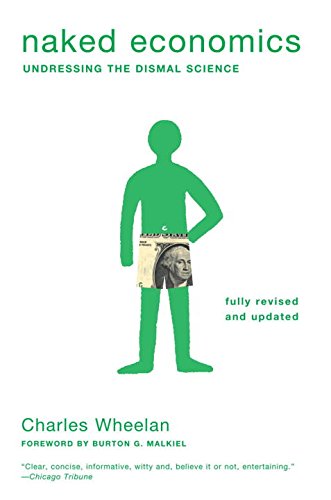
Naked Economics: Undressing the Dismal Science (Fully Revised and Updated)
A nice introductory approach to economics, and how economics is at the core of many important decisions made in this world.
Markets are consistent with our views of individual liberties. Communist governments interfered with their markets, controlling the prices of commodities and often wrecked themselves in the process as it did not accurately reflect supply/demand. Lots to be learned from the collapse of the Soviet Union. Monopoly stifles people’s needs to be innovative or adjust to market conditions.
Every action has a positive/negative result. Important to balance these when making decisions. Distributing the wealth of a small number of people across many poor people is more challenging than it seems. Higher taxes implies more flight to the ‘underground economy’ to preserve wealth. Everyone is trying to maximize their own utility.
Incentive structures are critical to markets.
Government plays an important role in the regulation of markets. We can and use government to interfere (positively) in our markets and firms often do. Black Rhino example = the more they are hunted, the more valuable the commodity becomes and the prices go up and incentives to hunt go up even higher. Same applies to fishing, one possible solution is to have a quota per fisherman. Overall quotas per state/city/country are not helpful as it creates perverse incentives to fish aggressively and take more of the share of benefits.
Externality = When the private costs of my behavior are different from the social costs. Ex: Buying an SUV instead of a smaller car, also polluting more of the environment in the process. When an externality is large, the gap between private costs and the societal cost of a behavior – people do things that make them better off at the expense of others. Ex: parents taking their bawling kids on airplanes (at no additional cost), creates massive utility for parents but negative utility for everyone else. Creates need for regulation.
Regulation is good, good government matters. At some level, bureaucracy in America is good for the market as it prevents bad actors from doing illegal business. Countries like Somalia where corruption is rampant, leads to bad incentives which leads to bad, inefficient markets and economies.
It seems remarkable that we often take substantial amounts of money to our bank and hand it over to people we have never met before. Or that when we use credit cards to buy a new CD or tennis racquet over the Internet, from a business that is located in some other state of country, we are confident we will get our merchandise, and they are confident they will get paid.
Tax cuts stimulate hard work and risk taking. Higher taxes result in ‘deadweight’ losses, where some people choose not to work to pay 50% of their salary to the government. US is a richer but more unequal place than Europe. “Deadweight” – when both parties do not net out with a gain.
Markets are rarely a zero sum game (unless in the case of perfect competition, which has been studied extensively). Story of America in a nutshell = Farmers producing crops. Person X sells a better tool to harvest crops and moves into town. Farmers buy tool to harvest more crops. Less farmers now making more crops due to better technology. Loss in farming jobs has created other jobs to keep up with the growth in economy. Ultimately, the number of crops sold goes up which is the most important metric.
Economics of Information party who has more information in a transaction is almost always better off. People often resort to this in the lack of information. Applies to everything from going to a McDonalds (predictable) in a foreign country, to hiring someone purely based of which university they went to. People also pay for information, curators who review music/films are filling that role in the market.
Human Capital dictates why some people are richer than others. HC is the sum total of skills embodied within an individual: education, intelligence, charisma, creativity, work experience, entrepreneurial vigor and even the ability to throw a baseball fast. Human capital matters because it is linked to productivity. More productive humans = richer humans = richer economies. Productivity is the measure of efficiency with which we can convert inputs to outputs.
All activity in financial markets fall into four categories –
- Raising capital
- Storing, protecting and making profitable use of excessive capital
- Insuring against risk
- Speculation
Politics and Economics Small groups with a deep passion for a topic (high utility risk) can have extraordinary influence on the rest of the population. Tail will wag the dog, so to speak. 9 right handed people for every left handed person. If lefties had to pay $900 for every $100 that a right handed person paid as taxes, would result in outrage. Politicians can gain favor by siding with the left handed side even if they are the minority, because their utility/risk is higher. Vocal minorities matter in politics. It’s not just how many people care about an issue one way or another, its how much they care.
Local recessions can become global issues. If the US economy weakens, we buy fewer goods from abroad. Mexico, which sends more than 80% of it’s exports to the US will suffer. In business, competitor’s misfortune is your gain but in global economics, the opposite is true.
Fiscal policy is the government’s ability to tax and spend money as a way to keep the economy progressing forward.
- Monetary policy involves changing the interest rate and influencing the money supply.
- Fiscal policy involves the government changing tax rates and levels of government spending to influence aggregate demand in the economy.
Budget deficit/surpluses – neither is good or bad, just depends on policy and what the country needs at the time. If the economy slips into recession, tax revenues will fall and spending on programs like unemployment insurance will rise. This will lead to a deficit, but it is also likely to help the economy recover.
The Fed – the most powerful economic body in the US and likely in the world. Fed controls America’s money supply. It moves interest rates by changing the quantity of funds available to commercial banks like Citi. It manipulates money supply to control interest rates, as it cannot do so directly. It sets a target federal funds rate. If banks are awash with money, interest rates must be relatively low to attract borrowers. And vice versa. Decided in the FOMC meetings. Funds are not given to banks for free, they trade in government bonds. Fed must maintain a rate of economic growth that’s neither too fast nor too slow, combating inflation. If interest rates are too low, results in too much borrowing, results in inflation.
Printing too much money (corrupt governments often do) results in inflation which is horrible for the consumer. People rush to spend their cash before it becomes worthless. On the other hand, deflation results in lower spending (money is worth more tomorrow), which affects economic growth.
International Economics strong/weak currencies are neither good nor bad. A country with a booming economy will typically have a currency that is appreciating. Strong growth presents investment opportunities that attract capital from the rest of the world.
Gold standard sounds good on paper but provides for horrible policy, especially during depression. Crowd frenzy during depression calls for people demanding gold for their paper money (as a safe bet) but the government has to protect its gold reserves (a finite resource), so naturally it has to increase interest rates. But, higher interest rates during a depression is terrible for the economy as it curbs spending and revival.
Trade is good for the world, especially for developing countries. Anti-globalization argument makes no rational sense. People are able to ‘trade’ or buy things that are already made, and that they don’t need to waste their time making. Extreme example = an engineer does not need to milk his own cows, he can buy the milk and focus on what he is good at (engineering). Free trade makes countries prosperous, limitations on trade affects growth.
Optimistic outlook shoe workers in Vietnam, or chinese Apple workers might get paid low, but they are choosing to do it and not being forced to (their alternatives are usually worse). Trade makes goods cheaper for consumers. Trade is voluntary exchange.
Author argues that the path to developing a poor nation includes the following steps –
- Effective government institutions
- Property rights
- No excessive regulation
- Human capital
- Geography
- Openness to trade
- Responsible fiscal and monetary policy
Natural resources matter less than you think.
I’m delighted to announce the release of the second single from the Sridhar & Arun Shenoy project. This was recorded in studios across San Francisco, Berlin and Singapore and working with an incredible team made things flow smoothly.











